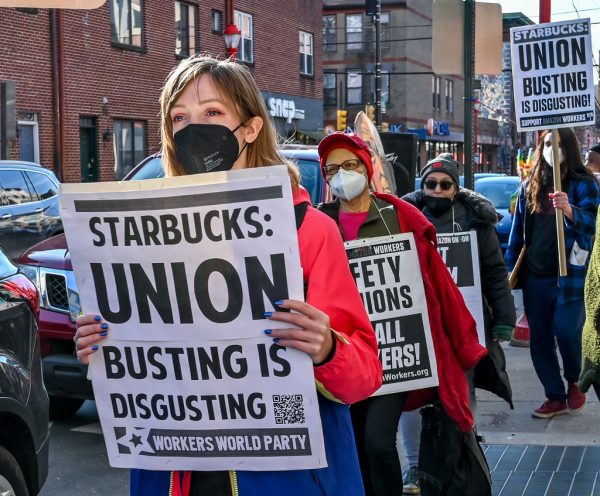By Ken Bank
March 21, 2024
Source: Originally published by Z. Feel free to share widely.

Predatory Capitalism Triumphs Over People And Community
There is a large sign over the Delaware River Bridge connecting New Jersey’s state capital with Pennsylvania that says “Trenton Makes, The World Takes”. When Starbucks gets through putting the screws to the people of Trenton, they’ll have to remake the sign to “Trenton Makes, Starbucks Takes”.
For several years Starbucks was “taking” lots of money made by the people of Trenton at the store located near the State Capitol Building. It is a very lucrative and profitable location for contributing substantial revenue to the parent company, especially from state employees, politicians and visitors. Starbucks has a virtual monopoly from that location charging exorbitant prices for their coffee and other products with very little competition.
Despite “taking” lots of money from the community, apparently the profits generated from the Trenton Starbucks was not enough to satisfy the greed of Starbucks executives and investors. They decided that the resources for operating at that location could be put to more profitable use in wealthier communities.
Without notice or consultation with community leaders or local officials, the company abruptly announced that it would close the Trenton store without any explanation or reasoning why they chose to do so. The lack of communicating to responsible persons whatever concerns the company had about operating the store at that location clearly indicates that profitability takes precedence over the needs and welfare of the surrounding community.
When Starbucks opened their Trenton store several years ago it was heavily promoted as a “community store” that would service the needs of the community by over-charging lower income residents for coffee and pastries. The store was also hiring unemployed labor from the surrounding neighborhood as a gesture of corporate “goodwill” and service to the community. Starbucks heavily promoted and advertised the opening of their store, along with local politicians and community leaders taking advantage of the free publicity.
Though the store operated profitably for several years, it did not generate as many profits to capitalist investors as other stores in wealthier communities. Evidently, the novelty of a “community store” servicing the needs and welfare of the local community was wearing off, and to the financial predators managing the company’s operations it became less relevant to the goal of maximizing profits for investors.
Despite its highly publicized “commitment” to public welfare and community service, the company quietly and quickly took steps to close the store without notice to its workers or the community. They did issue a public statement in March that the store would close at the end of the month. Hardly adequate time for laid off employees to adjust and find jobs elsewhere.
While the corporate suits with their MBAs were making decisions at Starbucks based on the financial interests of predatory capitalism, they totally ignored or misunderstood human behavior and public perception. Almost immediately after the store closing was announced, public reaction was swift and furious. The idea of a multi-billion dollar corporate giant closing the store in a distressed community and laying off dozens of residents from a poverty-stricken neighborhood sent shock waves that were felt all over the local news media.
Of course, the same politicians and community leaders that welcomed and praised Starbucks for its commitment to public welfare and community service a few years earlier were now condemning Starbucks for prioritizing investor greed over people. This was especially true about the Mayor of Trenton but also the local Congressional Representative, even the Governor of New Jersey Phil Murphy, getting involved and demanding that Starbucks reconsider its decision.
Given all the bad publicity that may do more damage to company profits than keeping the Trenton store open for business there is still a chance that Starbucks will change its policy. But over the years Starbucks has gained a reputation for notoriety when it comes to mistreating its employees and treating them merely as the means to maximize investor returns.
Until recently Starbucks was very aggressive in opposing any attempt by its workers to join a union. Despite numerous violations of established fair labor practices and government sanctions against Starbucks for exploiting and abusing its employees, the company continued to wage an unrelenting campaign in opposition to collective bargaining.
However, as with all the bad publicity generated by its decision to close the “community store” in Trenton, the corporate MBAs at Starbucks are beginning to rethink whether their anti-union, unfair labor practices are not worth the loss of public support and goodwill necessary to maintain profitability. In recent weeks Starbucks has begun the process of bargaining with unions representing their employees to establish what may become a model for the rest of the hospitality industry.
Just as Starbucks is changing its attitude about collective bargaining, there is still a chance, however faint, that they may reconsider and keep their Trenton store open for business. Even predatory capitalists at Starbucks have to recognize that bad publicity does not make for good profitability.
ZNetwork is funded solely through the generosity of its readers.DONATE

Ken Bank is a semi-retired business executive, part-time playwright, and freelance writer with masters degrees in business and history. He lives in New Jersey and is active in the local Democratic Party organization in support of progressive policies.

Predatory Capitalism Triumphs Over People And Community
There is a large sign over the Delaware River Bridge connecting New Jersey’s state capital with Pennsylvania that says “Trenton Makes, The World Takes”. When Starbucks gets through putting the screws to the people of Trenton, they’ll have to remake the sign to “Trenton Makes, Starbucks Takes”.
For several years Starbucks was “taking” lots of money made by the people of Trenton at the store located near the State Capitol Building. It is a very lucrative and profitable location for contributing substantial revenue to the parent company, especially from state employees, politicians and visitors. Starbucks has a virtual monopoly from that location charging exorbitant prices for their coffee and other products with very little competition.
Despite “taking” lots of money from the community, apparently the profits generated from the Trenton Starbucks was not enough to satisfy the greed of Starbucks executives and investors. They decided that the resources for operating at that location could be put to more profitable use in wealthier communities.
Without notice or consultation with community leaders or local officials, the company abruptly announced that it would close the Trenton store without any explanation or reasoning why they chose to do so. The lack of communicating to responsible persons whatever concerns the company had about operating the store at that location clearly indicates that profitability takes precedence over the needs and welfare of the surrounding community.
When Starbucks opened their Trenton store several years ago it was heavily promoted as a “community store” that would service the needs of the community by over-charging lower income residents for coffee and pastries. The store was also hiring unemployed labor from the surrounding neighborhood as a gesture of corporate “goodwill” and service to the community. Starbucks heavily promoted and advertised the opening of their store, along with local politicians and community leaders taking advantage of the free publicity.
Though the store operated profitably for several years, it did not generate as many profits to capitalist investors as other stores in wealthier communities. Evidently, the novelty of a “community store” servicing the needs and welfare of the local community was wearing off, and to the financial predators managing the company’s operations it became less relevant to the goal of maximizing profits for investors.
Despite its highly publicized “commitment” to public welfare and community service, the company quietly and quickly took steps to close the store without notice to its workers or the community. They did issue a public statement in March that the store would close at the end of the month. Hardly adequate time for laid off employees to adjust and find jobs elsewhere.
While the corporate suits with their MBAs were making decisions at Starbucks based on the financial interests of predatory capitalism, they totally ignored or misunderstood human behavior and public perception. Almost immediately after the store closing was announced, public reaction was swift and furious. The idea of a multi-billion dollar corporate giant closing the store in a distressed community and laying off dozens of residents from a poverty-stricken neighborhood sent shock waves that were felt all over the local news media.
Of course, the same politicians and community leaders that welcomed and praised Starbucks for its commitment to public welfare and community service a few years earlier were now condemning Starbucks for prioritizing investor greed over people. This was especially true about the Mayor of Trenton but also the local Congressional Representative, even the Governor of New Jersey Phil Murphy, getting involved and demanding that Starbucks reconsider its decision.
Given all the bad publicity that may do more damage to company profits than keeping the Trenton store open for business there is still a chance that Starbucks will change its policy. But over the years Starbucks has gained a reputation for notoriety when it comes to mistreating its employees and treating them merely as the means to maximize investor returns.
Until recently Starbucks was very aggressive in opposing any attempt by its workers to join a union. Despite numerous violations of established fair labor practices and government sanctions against Starbucks for exploiting and abusing its employees, the company continued to wage an unrelenting campaign in opposition to collective bargaining.
However, as with all the bad publicity generated by its decision to close the “community store” in Trenton, the corporate MBAs at Starbucks are beginning to rethink whether their anti-union, unfair labor practices are not worth the loss of public support and goodwill necessary to maintain profitability. In recent weeks Starbucks has begun the process of bargaining with unions representing their employees to establish what may become a model for the rest of the hospitality industry.
Just as Starbucks is changing its attitude about collective bargaining, there is still a chance, however faint, that they may reconsider and keep their Trenton store open for business. Even predatory capitalists at Starbucks have to recognize that bad publicity does not make for good profitability.
ZNetwork is funded solely through the generosity of its readers.DONATE
Ken Bank is a semi-retired business executive, part-time playwright, and freelance writer with masters degrees in business and history. He lives in New Jersey and is active in the local Democratic Party organization in support of progressive policies.
No comments:
Post a Comment